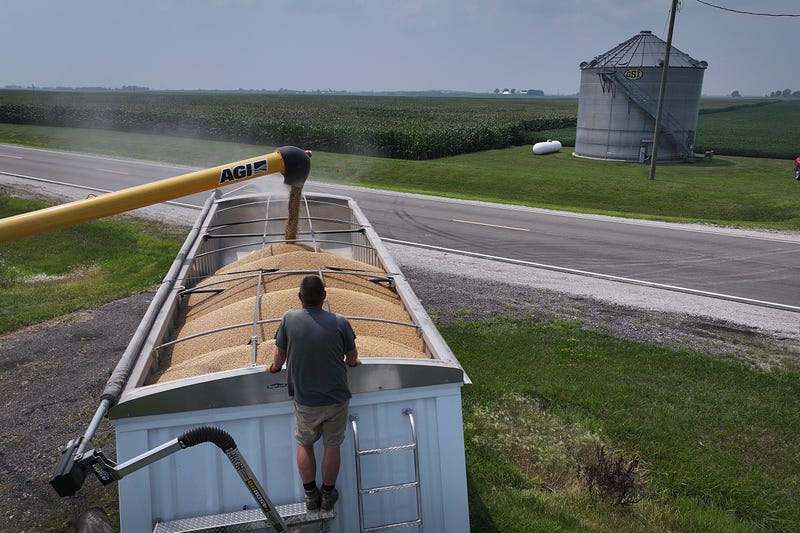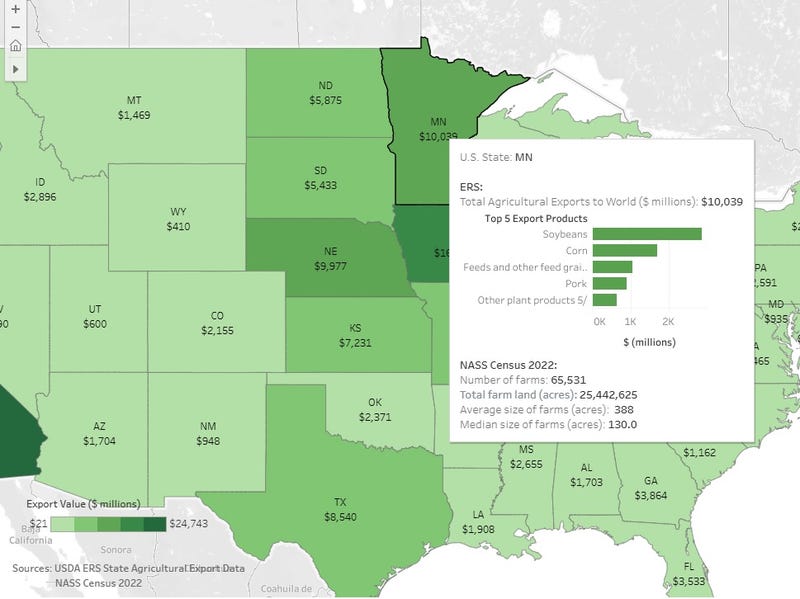
Soybeans are a big deal in Minnesota. The state produces more soybeans than any other exportable crop in the state, and that's saying something for a state that is fourth in the nation when it comes to agricultural exports.
Now, a new report via Reuters says the biggest buyer of those soybeans - China - is looking elsewhere, and that is cause for concern for Minnesota's Ag economy. More than half of Minnesota's soybeans are exported internationally. China is the largest importer of soybeans in the world. There are reports they have yet to buy any of the Autumn harvest in the U.S. dealing a huge blow to producers
"I'm not going to sugarcoat it," said Minnesota Ag Commissioner Thom Petersen. "It's a punch in the gut."
According to the Reuters report, Argentina waived grain export taxes dealing another setback to U.S. farmers already shut out of their top market and hit by low prices. Tariffs and a trade war with China, during a time when American exports usually dominate the trade market, allowed the South American country to step in and make a deal with Beijing who already put a 20% retaliatory tariff on American exports.
That is potentially shutting the door on farmers in the U.S. and in Minnesota.
"It's not a total surprise, I think, as we continue to keep the tariffs and the negotiations with China," Petersen adds. "Our farmers are looking at a big crop coming in here, we still have some old crop soybeans. We need to be moving some of this."
Putting more pressure on the market, there are about two months left in a tariff truce struck between the U.S. and China. U.S. and Chinese officials have held four rounds of trade talks between May and September, with another likely in the coming weeks. Both sides have paused high tariffs and pulled back from harsh export controls, but China is still levying an additional 10% to 15% tariffs on U.S. farm goods.
"Here is the impact on this farmer," says Petersen. "They're going to have to store their grain. They're going to have to take a lower price. This is what this means. They're losing $100 an acre, $150 an acre. This is the impact on these families, on these communities."
From January through July, American farm exports to China fell 53% compared with the same period last year. The damage was even greater in some commodities: U.S. sorghum sales to China, for instance, were down 97%.
Petersen said he spent much of Wednesday on the phone with soybean farmers talking about what they're going to do.
"It's really frustrating to lose a big bucket like that, but in the meantime we're going to need to fill some smaller buckets with other countries, and keep working on it," Commissioner Petersen explained to WCCO Radio Thursday morning. "We need Washington to understand the importance of this decision and the impact it has on farmers in Minnesota and the nation."
Minnesota 1st District Congressman Brad Finstad (R) is also a soybean farmer and will be combining his crop later Thursday. On the WCCO Morning News hosted by Tom Hauser of KSTP-TV, Finstad he's very concerned about China looking to other countries, but defended the trade policies of the Trump administration.
"Here's the deal, for the last four years we have been in a trade deficit in this country," Finstad tells WCCO. "China was gobbling up 60% of our soybeans, and we did nothing to diversify our partners and our trade opportunities. And now that we see China has such a grip on that market, it's really important that we continue these new trade deals to diversify our partners, and I was encouraged just this morning to see China commenting that they do want to start talking about potentially buying more soybeans here in the near future."
Finstad added that it appears to be a signal China would 'get back to the table' and renegotiate some of the current trade deals and tariff levels.
"That will be good, but ultimately, we have to continue to work hard to diversify our opportunities for trade when it comes to soybeans," Finstad said.
Minnesota sells about one out of every three rows of soybeans internationally with most going to China, according to Petersen.
"So, not to have any orders on the books with them is tough, when that's your biggest customer," he said. "That takes a big hit for our farmers and leaves a lot of uncertainty. We're still hoping we come to a deal, but it gets more concerning when you see the purchase from Argentina."
Since the tariff war of 2018 and 2019, Minnesota now sells only one out of every four rows, and even that is now in jeopardy.
That gives soybean farmers two, not so great choices: sell at a loss, or pay to store them, something many were already doing according to Commissioner Petersen.
Illinois and Iowa are typically the top two states for soybean exports, with other Midwestern states like Minnesota and Indiana also holding significant positions due to high production levels.
Minnesota exported over $9 billion in Ag products in 2023, with China buying close to 20% of those. Soybeans represent a quarter of Minnesota's exports.
"It's a lot of stress on farmers as they look at it, whether it's markets and worrying about breakdowns and things like that, so it continues," Petersen explains. "While there's a lot of emphasis on soybeans, there's other markets that we're seeing potential disruptions. Whether that's pork or canola, other crops that that we grow in Minnesota, or livestock."
He adds that the U.S. needs to add more exports to places like South Korea, Philippines, and Colombia to make up for the loss of Chinese buyers. But, most importantly says Petersen, there needs to be some stability in the ongoing tariff wars, and that farmers have been 'caught in the middle.'
While the Trump Administration is touting trillions of dollars in tariff income, it still remains to be seen what the overall economic impact of them will be, with farmers now feeling the biggest burden from these ongoing trade wars.
"I'm gonna devote a little bit of the tariff money to our farmers," President Donald Trump said in the Oval Office later on Thursday afternoon. "We'll have a little bit of shortfall for the farmers until the tariffs kick in. They'll be struggling until the transition is complete."
Their use in reducing the federal deficit could be at least nominally offset by a needed bailout for farmers if their export markets continue to dwindle.

